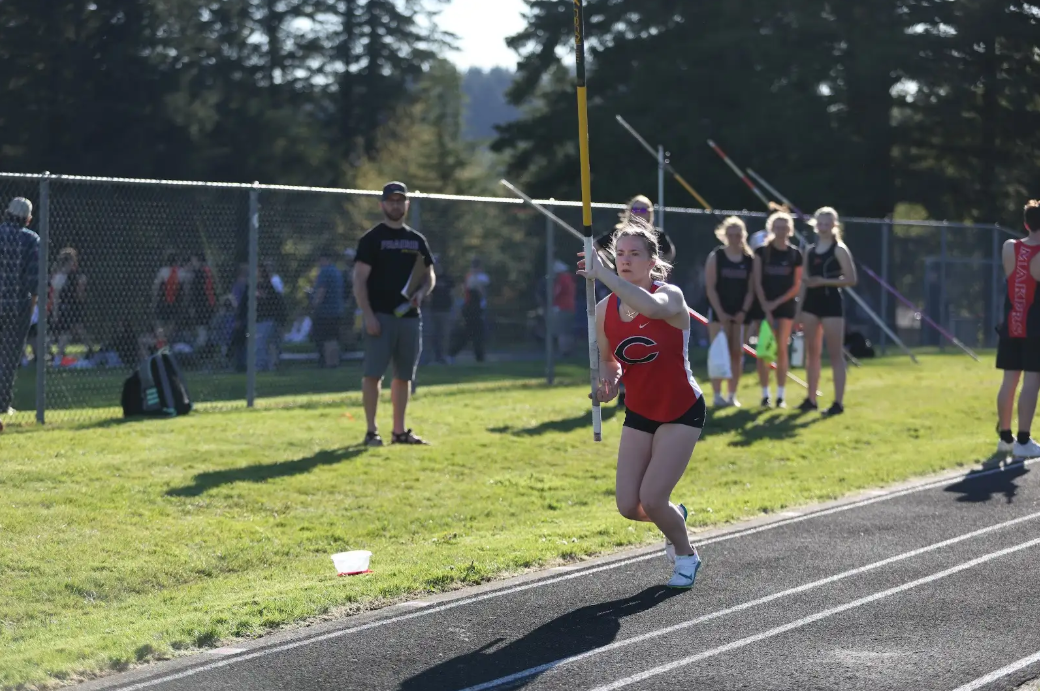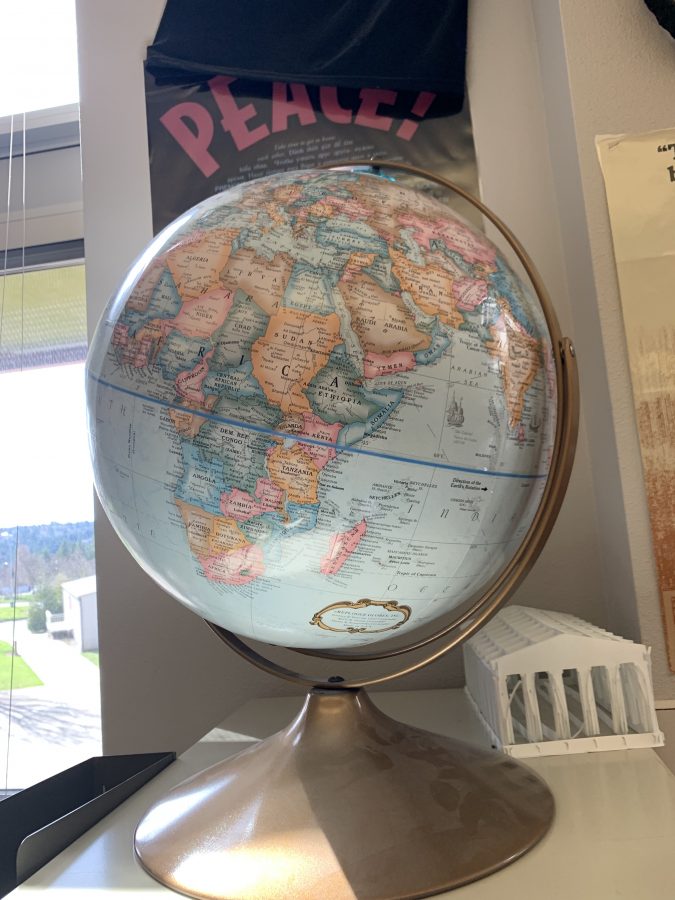CHS students Tayyaba Naushab and Nadiyah Nilfannisa are both originally from a different part of the world. These two students have had to adjust to the way students do things here. In the time these two have been here, they have set themselves apart from the rest of the CHS students. Each of them has unique backgrounds, and stories that show what it was like for them to go from living in a country from across the world to the United States. Although they are both from different parts of the world, Tayyaba and Nadiyah have something in common, they share the same religion, the girls are both Muslim.
Tayyaba’s dad was born in Pakistan but moved here when he and his siblings were very young. He went to college here, stayed for two years after finishing college, and then moved back to Pakistan where he was married to Tayyaba’s mom. They moved back to the U.S. for two years, had two kids, moved again back to Pakistan, and had two more. Then, for the safety of their kids, they moved to the U.S. and have stayed there for 8 and a half years, which would bring the time back to today. “It’s not that safe there,” Naushab says before explaining why they really moved back to the U.S. “The main reason was our neighbor got kidnapped and killed. He was only a kid.”
 Tayyaba Naushab was born and raised in the country of Pakistan. “I moved here in 2010. So August 8th, 2010,” says Naushab. “I’ve actually lived there longer than here.”
Tayyaba Naushab was born and raised in the country of Pakistan. “I moved here in 2010. So August 8th, 2010,” says Naushab. “I’ve actually lived there longer than here.”
Pakistan has some big differences from the U.S., but what was the first thing this particular Pakistani claims she noticed first? Of all things, she noticed that everyone wears seatbelts. “First off you had to wear seatbelts, that was the first thing I noticed. There are seatbelts in cars [In Pakistan], but it’s not a law to wear it. You know how if you don’t wear it here you get arrested for it? Back there no one cares,” Tayyaba explains. “I was like wow lights and cities, and oh wow seatbelts? Okay,” says Naushab humorously.
Naushab goes on to explain how people are out on the roads in her country. “There’s a lot of people honking at each other. There are no specific lanes telling you where to go like in America. In Pakistan, it’s not like that. A person who’s going straight from your right side will keep going straight, but then the person from the other side will also be coming in the same lane,” she illustrates.
Aside from adjusting to having to wear a seatbelt everywhere, learning a new language can be difficult, but Tayyaba claims that it was not as hard as you might think. Naushab knows how to speak, read, and write Urdu and English. She can read and write Arabic but can’t speak it; And she can understand Farsi but cannot read, write, or speak it.“It wasn’t hard because in Pakistan, in school, we had to speak English. We got hit with a ruler on our hand if we did not. We already knew English because of our dad. He taught us and spoke it with us in Pakistan so it wasn’t really that hard, but I’m not gonna say it was easy because I did have a lot of trouble speaking in English,” Naushab answers.
Although Tayyaba was born and raised in Pakistan, she does not see herself living there long term at any point in the future. “I just wanna visit for vacation,” Tayyaba finalizes.
Here at Camas High School, we have a number of exchange students from all over the world. Nadiyah Nilfannisa is one, she is a senior here at CHS, she came to Camas all the way from Indonesia. Nadiyah is just like any other student here, aside from being part of a different country and having a different religion, she has some qualities that make her stand out. Nadiyah is a Muslim so she has a little bit of a different lifestyle than most kids here.
Part of being a Muslim, she has a lot of things she must practice daily to uphold her culture. Like she must pray five times a day and she  fasts during the month of Ramadan. Ramadan is a huge part of the Muslim religion, it is the ninth month of the Islamic calendar in which they fast from sunrise to sundown. There is also little rules that she does to practice her religion, Nadiyah expresses that “I do not eat pork” and “ We also can’t get dog’s saliva on our bare skin. It is considered unclean. If maybe we still want to touch a dog, we should clean it a certain way.”
fasts during the month of Ramadan. Ramadan is a huge part of the Muslim religion, it is the ninth month of the Islamic calendar in which they fast from sunrise to sundown. There is also little rules that she does to practice her religion, Nadiyah expresses that “I do not eat pork” and “ We also can’t get dog’s saliva on our bare skin. It is considered unclean. If maybe we still want to touch a dog, we should clean it a certain way.”
Indonesia is much different than America in many ways, the weather here is different, there is no snow in Indonesia, and the schools and technology here is a lot better. Also for example when greeting people Nadiyah explains that “it is not polite if you call a person that is older than you with their last or first name only. It should go with Mr. or Mrs. and then followed by their name.” Also in Indonesia, they do not care much about seat belts, so aside from all the adjustments Nadiyah has made to her daily life, she has to top it all with remembering to wear a seatbelt.
Another huge part of being a Muslim is the hijab, Muslim women wear them in the presence of any male outside their immediate family. It is worn as an Islamic standard of modesty. Being in a new country is already different as people tend to notice you more because you are not exactly like them. Nadiyah has more attention drawn to her because of wearing the hijab, “sometimes people are just staring at me and some people just smile and try to be nice. But I like when people are questioning about my hijab. It means they more care about surroundings” said Nadiyah. Nadiyah does not let this hold her back, she embraces being different and wants people to see her as she is and not hide her true self. She came here not to just see a new country but she has a bigger reason for why she came here. Nadiyah says “My mission is also to make people get used to living around Muslim and change the stereotypes and misconception.”
Moving away from home is hard, as well is leaving behind all their loved ones and culture. Nadiyah does not let this stop her from thriving in life. She is a Muslim and she is different than almost everyone in Camas. Adjusting here from Indonesia is definitely tough. Nadiyah has had a lot of changes in her daily routine, from weather changes to diet changes, “we usually eat rice for breakfast, lunch, and dinner, we eat with a spoon and fork” claims Nadiyah.
Tayyaba and Nadiyah have very different cultural backgrounds from almost every student at Camas High School, but they do not let that stop them from getting involved in the school and community, and living life to the fullest. Differences are what bring people together in a community, they should not be used to divide people. If everyone can continue to accept what makes people unique the Camas community will continue to grow as a strong and supportive environment for all.


































